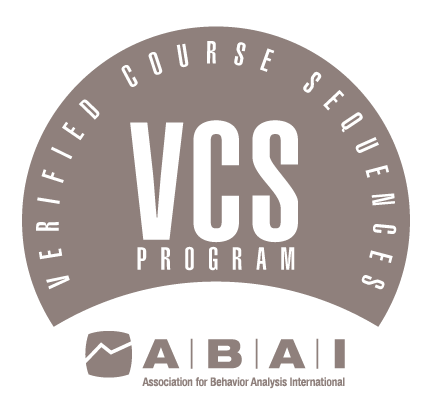Application deadline
Credits and costs
Gain the Skills to Help Improve Students’ or Patients’ Lives
Develop, implement, and monitor behavioral interventions.
Help change behavior for those with intellectual disabilities, autism, and emotional and behavioral disorders.
Create a purposeful environment in which children with special needs can thrive.
Learn to improve communication and social skills through research-based teaching methods.
Advance Your Teaching Proficiency with Online Courses
Advance Your Teaching Proficiency with Online Courses
The courses in this applied behavior analysis certificate program can prepare you to sit for the 5th Edition BCBA certification examination. The program may also help you renew or maintain your existing certification if you are already a certified teacher; however, it is not designed to lead to initial teacher certification in any state.
Penn State’s seven-course sequence is based on the BACB’s 5th Edition Task List, which went into effect in January 2022, and is intended to prepare you to sit for the 5th Edition BCBA certification examination. The Association for Behavior Analysis International has verified the seven courses specific to the ABA emphasis toward the course work requirements for eligibility to take the Board Certified Behavior Analyst® examination.
In addition to completing the specified course work, the BACB also requires a graduate degree (i.e., master’s or doctoral) and supervised fieldwork experience that meets the 2022 fieldwork requirements in order to qualify to take the BCBA certification exam.
Required Courses (21 credits)
- 3credits
Introduces students to single-case research design and methodology. This course is designed to provide the student with all the necessary tools needed to formulate questions that require repeated measures observation and analysis, including the use of visual and statistical analytic methods.
- 3credits
This course covers the foundational underpinnings of the field of applied behavior analysis, which uses principles of behavior to positively impact client outcomes. The field emphasizes an empirical base through the use of experimental analysis of key variables in order to develop evidence-based interventions.
- 3credits
This course teaches the basic principles of applied behavior analysis, the building blocks necessary for developing evidence-based behavioral interventions.
- 3credits
This course teaches students how to conduct and interpret various behavioral assessments. Students will explore various behavioral assessments including skills assessments, preference assessments, direct and indirect functional behavior assessments, and experimental functional analysis.
- 3credits
This course utilizes the concepts and foundations taught in the prerequisite courses in order to guide students towards developing the skills necessary in implementing evidence-based practices and selecting the appropriate procedures when targeting behaviors for change.
- 3credits
This course builds on the concepts taught in the prerequisite courses and will cover organizational behavior management, which can be defined as using a behavior analytic framework to teach students how to train, supervise, monitor, and provide feedback to personnel who are implementing academic and behavior change programs.
- 3credits
In this class students will learn about the governmental and professional disciplinary standards that regulate the field of behavior analysis in special education. Beyond the letter of the law, students will work through case studies where ethical dilemmas are presented in an effort to tease out the underpinnings of ethical behavior.
Course Availability
If you're ready to see when your courses will be offered, visit our public LionPATH course search (opens in new window) to start planning ahead.
Start or Advance Your Career

Start or Advance Your Career
If you want to work in the helping professions (e.g., teachers, speech/language pathologists, therapists, counselors, behavioral analysts), this program can help add to your professional knowledge base, making you better prepared to address behavioral issues in the classroom and in early intervention, home, and community settings.
You can use the knowledge gained from this program and the support of Penn State career resources to pursue careers in a variety of fields, depending on your goals.
Career Services to Set You Up for Success

From the day you're accepted as a student, you can access resources and tools provided by Penn State World Campus Career Services to further your career. These resources are beneficial whether you're searching for a job or advancing in an established career.
- Opportunities to connect with employers
- Career counselor/coach support
- Occupation and salary information
- Internships
- Graduate school resources
Ready to Learn More?
Get the resources you need to make informed decisions about your education. Request information on this program and other programs of interest by completing this form.
Ready to take the next step toward your Penn State graduate certificate?
Costs and Financial Aid
Costs and Financial Aid
Learn about this program's tuition, fees, scholarship opportunities, grants, payment options, and military benefits.
Costs and Financial Aid
Graduate Tuition
Graduate tuition is calculated based on the number of credits for which you register. Tuition is due shortly after each semester begins and rates are assessed every semester of enrollment.
2025–26 Academic Year Rates
| How many credits do you plan to take per semester? | Cost |
|---|---|
| 11 or fewer | $1,037 per credit |
| 12 or more | $12,448 per semester |
Paying for Your Certificate
Students pursuing a certificate are considered "nondegree," a status that is not eligible for federal student aid, including the Federal Direct Stafford Loan program. A private alternative loan may be an option to consider.
Additionally, Penn State offers many ways to pay for your education, including an installment plan and third-party payments. Penn State World Campus also offers an Employer Reimbursement and Tuition Deferment Plan. Learn more about the options for paying for your education.
Students pursuing a degree and meeting all other eligibility requirements may qualify for financial aid.
Military Benefits
Military service members, veterans, and their spouses or dependents should explore these potential military education benefits and financial aid opportunities, as well.
Additional Cost of Attendance Details
To view the detailed list of cost of attendance elements:
- visit the Tuition Information site
- click the plus sign to expand the table
- select a semester from the World Campus row
Technical Requirements
Review the technical requirements for this program.
A Head Start toward a Master's Degree

A Head Start toward a Master's Degree
Not only can this program help create opportunities in your career, it can also give you a solid head start toward a full master’s degree.
Degree Program Related to This Certificate
If you apply and are accepted into this master's program, you will be able to apply up to 15 credits toward the M.Ed. in Special Education degree requirements.
Learn to support students with special needs. This online degree program focuses on current issues and topics in the field of special education and gives you the opportunity to choose an emphasis in academic and behavioral supports, applied behavior analysis, or autism.
Learn more about the Master of Education in Special EducationApplied Behavior Analysis Graduate Study

Applied Behavior Analysis Graduate Study
Certification as a Board Certified Behavior Analyst (BCBA) through the Behavior Analyst Certification Board (BACB) is the most prominently recognized credential in the field. It allows professionals to demonstrate that they have met standards for the profession through board examination.
- 21-credit, 315-hour, seven-course sequence based on the Behavior Analyst Certification Board’s 5th Edition Task List and intended to prepare you to sit for the 5th Edition BCBA certification examination. The Association for Behavior Analysis International has verified our course sequence toward the course work requirements for eligibility to take the Board Certified Behavior Analyst® examination.
- In order to qualify to take the BCBA certification exam, students will need to complete a supervised fieldwork experience that meets the 2022 fieldwork requirements set by BACB.
- BCBA exam pass rate data for our program (and all other verified course sequences) can be found on the BACB’s Verified Course Sequences web page.
Who Should Apply?
Who Should Apply?
If you have a background in education or human services, would like to become a Board Certified Behavior Analyst, or want to learn about interventions to produce lasting change in behavior, you will find this program to be extremely useful.
- teachers
- behavioral specialists
- mobile therapists
- educational consultants
- speech-language pathologists
- school counselors
- social workers
- psychologists
- medical professionals
- occupational and physical therapists
- mental health counselors
Act 48–Approved
Penn State is an Act 48–approved provider for Pennsylvania educators, so the courses for the Graduate Certificate in Applied Behavior Analysis may count toward professional development hours.
How Long to Complete This Program?
Our courses typically follow a 12- to 15-week semester cycle, and there are three semesters per year (spring, summer, and fall). The fieldwork for the BACB certification usually takes at least two years to complete.
Convenient Online Format
This program's convenient online format gives you the flexibility you need to study around your busy schedule. You can skip the lengthy commute without sacrificing the quality of your education and prepare yourself for more rewarding career opportunities without leaving your home.
A Trusted Leader in Online Education

Penn State has a history of more than 100 years of distance education, and World Campus has been a leader in online learning for more than two decades. Our online learning environment offers the same quality education that our students experience on campus.
Professional Licensure / Certification
Disclosures
Many U.S. states and territories require professional licensure/certification to be employed. If you plan to pursue employment in a licensed profession after completing this program, please visit the Professional Licensure/Certification Disclosures by State interactive map for more information.
How to Apply to Penn State

How to Apply to Penn State
Apply by January 2 to start January 12
Application Instructions
Deadlines and Important Dates
Complete your application and submit all required materials by the appropriate deadline. Your deadline will depend on the semester you plan to start your courses.
Spring Deadline
Apply by January 2 to start January 12Summer Deadline
Apply by April 15, 2026, to start May 18, 2026Fall Deadline
Apply by June 30, 2026, to start August 24, 2026
Steps to Apply
For admission to the J. Jeffrey and Ann Marie Fox Graduate School, an applicant must hold either (1) a baccalaureate degree from a regionally accredited U.S. institution or (2) a tertiary (postsecondary) degree that is deemed comparable to a four-year bachelor's degree from a regionally accredited U.S. institution. This degree must be from an officially recognized degree-granting institution in the country in which it operates.
Please note that while Penn State's program requires a bachelor's degree for admission, the BACB requires a master's degree in order to become certified as a BCBA. If board certification is your ultimate goal, we advise you to verify that your degree will satisfy the BACB requirement before you begin your course work with Penn State. Please visit the BACB's website for more information.
You will need to upload the following items as part of your application:
Official transcripts from each institution attended, regardless of the number of credits or semesters completed. Transcripts not in English must be accompanied by a certified translation. If you are a Penn State alum, you do not need to request transcripts for credits earned at Penn State but must list Penn State as part of your academic history.
English Proficiency — The language of instruction at Penn State is English. With some exceptions, international applicants must take and submit scores for the Test of English as a Foreign Language (TOEFL) or International English Language Testing System (IELTS). Minimum test scores and exceptions are found in the English Proficiency section on the Fox Graduate School's "Requirements for Graduate Admission" page. Visit the TOEFL website for testing information. Penn State's institutional code is 2660.
You do not have to provide a cover letter, letters of recommendation, or test scores with your application.
To begin the online application, you will need a Penn State account.
Create a New Penn State Account
If you have any problems during this process, contact an admissions counselor at [email protected].
Please note: Former Penn State students may not need to complete the admissions application or create a new Penn State account. Please visit our Returning Students page for instructions.
You can begin your online application at any time. Your progress within the online application system will be saved as you go, allowing you to return at any point as you gather additional information and required materials.
- Choose Enrollment Type: "Certificate Admission"
- Choose "WORLD CAMPUS" as the campus
Checking Your Status
You can check the status of your application by using the same login information established for the online application form.5. Complete the application.
Admissions Help
If you have questions about the admissions process, contact an admissions counselor at [email protected].
Contact Us

Contact Us
Have questions or want more information? We're happy to talk.
To learn more about the Graduate Certificate in Applied Behavior Analysis program, please contact:
World Campus Admissions Counselors
Phone: 814-863-5386
Email: [email protected]
Kelly A. Mercorella, Ph.D., BCBA-D
Phone: 814-863-2286
Email: [email protected]
Learn from the Best
Learn from the Best
One of the primary reasons Penn State is recognized around the globe as a distinguished university is the faculty. This program is offered in partnership with the Penn State College of Education and as a student, you will have the opportunity to learn from the same instructors who teach traditional, face-to-face classes on Penn State's campuses across Pennsylvania.
Faculty
Rick Kubina
- DegreePh.D., Special Education, The Ohio State University
- DegreeM.A., Special Education, The Ohio State University
- DegreeB.A., Psychology/Sociology and Women’s Studies, Youngstown State University
Dr. Rick Kubina, BCBA-D, is a professor of special education at Penn State and a Board Certified Behavior Analyst with doctoral designation. Dr. Kubina's research focuses on the science of individual measurement and performance/learning improvement. He is the co-author of The Precision Teaching Book and the co-founder of Chartlytics, a web application system for precisely pinpointing and recording behavior for making decisions and using repeated problem-solving to help learners experience effective and efficient learning outcomes.
David Lee
- DegreePh.D., Special Education, Purdue University
- DegreeM.Ed., Special Education, California University of Pennsylvania
- DegreeB.S., Psychology, University of Pittsburgh
Dr. David Lee, BCBA-D, is a professor of special education. The focus of Dr. Lee’s research is to develop, evaluate, and disseminate programs to support students with or at risk for emotional/behavior disorders. His research draws upon a behavior analytic framework to create positive, function-based interventions for students, primarily in middle/high school.
Kelly Mercorella
- DegreePh.D., Applied Behavior Analysis, Columbia University
- DegreeM.S., Applied Behavior Analysis, Columbia University
- DegreeB.S., Psychology, Fordham University
Dr. Kelly Mercorella, BCBA-D, is an assistant professor of special education at Penn State and teaches a variety of courses for the online M.Ed. program in Special Education. Dr. Mercorella's research interests center around facilitating reading comprehension for elementary students with disabilities, particularly designing interventions to instruct students on visualization strategies related to reading. Prior to earning her doctorate, Dr. Mercorella was a special education teacher in both self-contained and inclusive settings, serving students from Pre–K through fifth grade.
